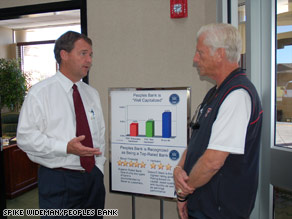It’s easy to become cynical when all you hear in the media is bad news. But not all news is bad. In a recent CNN article there was some refreshing comments from small, but healthy, banks. They were making loans and, for the most part, it was business as usual.
Here are some comments from the article:
Conservative lending practices seem to be a common denominator among banks that have remained strong and stable during the current banking crisis, and those banks are still making loans.
Peoples Bank President Todd McKee, left, chats with customer Tommy McVay on Friday in Lubbock, Texas.
Peoples Bank President Todd McKee, left, chats with customer Tommy McVay on Friday in Lubbock, Texas.
The failures of behemoths such as Washington Mutual and IndyMac have drawn media attention, but not all big banks are in trouble — and smaller banks are not immune.
For sometime, as a business ethics speaker, I have said that the underlying problem related to the economic crisis we’re facing today has been founded in a lack of business ethics. For those comments I have been the brunt of criticism. But, if ETHICS is choosing good from bad with a moral obligation and duty…then I submit that what is reported in the CNN report supports my position.
“Our underwriting standards have tightened a little bit,” said Ronald Heaton, president of the Cedar City, Utah, bank. “… Our standards haven’t changed drastically, and we’re still loaning … but we’re watching our underwriting standards closely so that people are able to repay their loans.”
Mortgages that didn’t require borrowers to prove their income or make a down payment got many lenders into trouble, but his bank never offered those: “Didn’t make sense,” he said.
Some would-be borrowers “wanted us to do everything, and we said, ‘We don’t do everything. We have standards,’ ” Heaton added.
Nonbank mortgage lenders were able to generate substandard mortgages because they were not adequately regulated by the federal government, Heaton said.
Now those bad loans have come home to roost, the nonbank lenders are out of the game, and State Bank of Southern Utah’s mortgage business is picking up, Heaton said.
Folks…that’s just plain ole good ethics. Heaton (whom I’ve never spoken to or met) is 100% accurate. If you have standards (founded by sound business ethics) you won’t find yourself in major financial trouble. I contend that lending practices, that were not founded with sound ethical principles, are in large part the root cause of why we are where we are today.
Another part of the CNN report states:
In Texas, the state Department of Banking says state-chartered institutions wisely stayed out of the subprime game.
“That’s not what we do. We’re not in the subprime market whatsoever,” said Todd McKee, president of Peoples Bank in Lubbock. “Lending here is the same as it’s always been.”
The way it’s always been is up close and personal. McKee said his bank’s customers prefer to do business with tellers face-to-face rather than through the drive-up window.
“I’m president of the bank, and I sit right by the front door, so I wave at every single soul that walks in the bank. Everybody has access to me,” he said. “My partner [Larry Allen] is the CEO. … He sits at the other door. So we know everybody that comes in the door.
May sound “hokey” but that is banking the way it was meant to be. I recall my first loan when I was 18 years old (I’m now 51) was made – not by a credit score – (funny I don’t think they existed then), but rather the loan was made on character and the fact that the bank president trusted me to repay (and knew where my mama was if I didn’t). I paid the loan back and was proud to do business with them.
This last comment from the article states it best – “You can look at credit all day, you can look at collateral, but if they can’t make that payment, there’s no sense in making that loan. And we’ve always done that. We’re all supposed to do that.” That is business ethics!



